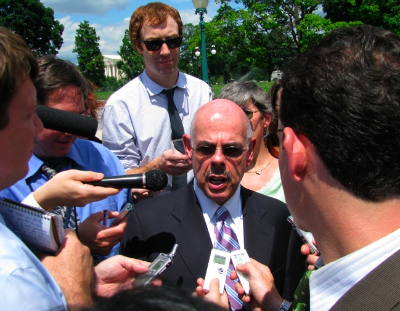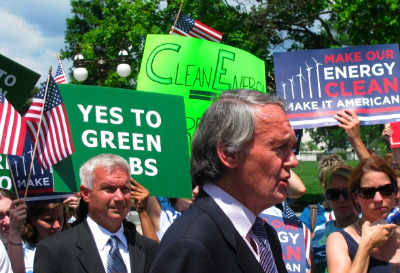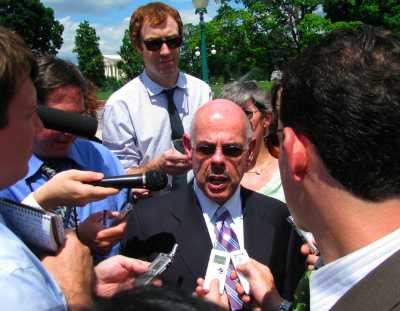Update: The House on Friday passed the Waxman-Markey bill, 219 to 212. The story below was written ahead of that vote, but its focus on how environmental groups hope to improve the bill in the Senate remains timely.
Environmental groups are downplaying hopes that their allies in Congress will be able to strengthen the American Clean Energy and Security Act once the House begins debate on the bill later this week, though some officials from climate action groups remain optimistic that the bill can be strengthened later in the legislative process.
 Henry Waxman at a June 24 rally in support of the far-reaching energy and climate bill he coauthored.Kate Sheppard / GristThe key concern for the environmental community is the deal worked out this week between the bill’s authors, Henry Waxman (D-Calif.) and Ed Markey (D-Mass.), and Agriculture Committee Chairman Collin Peterson (D-Minn.), who had threatened to torpedo the bill if his demands on a range of farm-state issues weren’t met.
Henry Waxman at a June 24 rally in support of the far-reaching energy and climate bill he coauthored.Kate Sheppard / GristThe key concern for the environmental community is the deal worked out this week between the bill’s authors, Henry Waxman (D-Calif.) and Ed Markey (D-Mass.), and Agriculture Committee Chairman Collin Peterson (D-Minn.), who had threatened to torpedo the bill if his demands on a range of farm-state issues weren’t met.
Even though concessions made to Peterson drew fire from many green groups, the precarious nature of the Waxman-Markey compromise has most environmental groups wary of trying to overhaul the bill during the House debate.
“It doesn’t feel likely that there will be opportunities to offer amendments on the floor that are going to be the big fixes,” said Navin Nayak, director of the Global Warming Project at the League of Conservation Voters. “At this point, it’s more about meeting the deadline that they’ve set for the end of this week.”
Most of the big environmental organizations, including the League of Conservation Voters, Sierra Club, National Wildlife Federation, and Environmental Defense Fund, are holding to the “strengthen and pass” motto.
 Track the debate and more >>>Sierra Club Energy and Global Warming Program Director David Hamilton told Grist he thinks that the bill will be amended to encourage more government purchasing of renewable energy. Hamilton said Waxman and Markey asked for suggestions on how to improve it without threatening the fragile compromise with Peterson. “They said give us things that won’t screw up the deal, but be creative about where you get them,” he said.
Track the debate and more >>>Sierra Club Energy and Global Warming Program Director David Hamilton told Grist he thinks that the bill will be amended to encourage more government purchasing of renewable energy. Hamilton said Waxman and Markey asked for suggestions on how to improve it without threatening the fragile compromise with Peterson. “They said give us things that won’t screw up the deal, but be creative about where you get them,” he said.
What can be done?
The biggest flaws environmental organizations have identified in Waxman-Markey include the removal of the EPA’s authority to regulate greenhouse gas regulations under the Clean Air Act, the grandfathering of old coal-fired power plants in the initial years of the cap-and-trade program, and the delay in considering the climate impacts of indirect land use in biofuel production, among others.
Sierra Club’s Hamilton, like many others in the environmental community, said he is not expecting there to be too much room for improvement in this week’s debate. Amendments can be submitted up until 9:30 a.m. on Thursday, but the Rules Committee — consulting closely with House leaders like Speaker Nancy Pelosi, Waxman, and Markey — gets to decide which amendments get a vote. Due to the tenuous nature of the deal Democrats have forged, it’s unlikely that the Democratic leadership would permit amendments that could jeopardize the deal. They will likely, however, permit minor strengthening amendments to please more progressive members and to prevent floor debate from being limited to only Republican amendments.
“I think there is minimal opportunity for strengthening on the House floor,” said Hamilton.
LCV’s Nayak said the Democrats’ tight hold on how the House debate will unfold means there will be few opportunities for opponents to weaken the legislation. “A lot of the deals that have been cut have chipped away at it already,” said Nayak. “So I think there’s hope that some of the big weakening issues … will be avoided.”
Both Nayak and Hamilton stressed the importance that passing Waxman-Markey this week will play in creating additional opportunities for improvement. “We believe if we’re going to have a chance to strengthen the bill, you’ve got to get it through the House,” said Hamilton.
Hamilton said his group is already in discussions with the Senate Environment and Public Works Committee, under the leadership of Barbara Boxer (D-Calif.). “We’re trying to figure out what are the most strategic ways to plug what we see as holes in this thing without completely scotching the deal that Waxman came up with,” said Hamilton.
Boxer has said that her committee will produce a climate bill by the end of August that would serve as the Senate counterpart to Waxman-Markey. “My sense is that they will use the Waxman bill as a guide, but they will not be averse to making some strategic changes where they think they are useful,” said Hamilton of his conversations with Boxer’s committee.
Dan Lashof, director of the Climate Center at the Natural Resources Defense Council, echoed similar optimism about the Senate’s likely approach. “The dynamic there is a little different. because the committee is very friendly to this,” he said, comparing it to the House’s Energy and Commerce Committee, which includes more lawmakers from rural and energy-producing districts. “We can fix some problems in the House bill in committee.”
The chief threat to Boxer’s approach comes from the Senate Energy and Natural Resources Committee, which last week approved a bill that had environmental groups cringing.
First things first
Getting the climate and energy bill through the House might still be a challenge. The bill’s authors told reporters that they’re confident they can pass it, but they’re still counting votes. The enviro groups backing it are also working to whip up support through paid advertising and grassroots efforts.
 Ed Markey talks to the press during a June 24 rally on Capitol Hill.Kate Sheppard / GristNRDC’s Lashof said his group is focusing on a “huge education effort” geared at representatives who are members of the committee that approved the bill last month, Energy and Commerce.
Ed Markey talks to the press during a June 24 rally on Capitol Hill.Kate Sheppard / GristNRDC’s Lashof said his group is focusing on a “huge education effort” geared at representatives who are members of the committee that approved the bill last month, Energy and Commerce.
LCV announced on Tuesday that it will not endorse any legislator who votes against the bill, which includes legislators who oppose it from both the right and the left. “It doesn’t matter where they’re from,” Tony Massaro, LCV senior vice president for political affairs and public education told Grist. “They vote against it, they voted the wrong way … We want a ‘yes’ vote, and if you vote against it you’re not eligible for an endorsement. “
Massaro said that even if a representative votes with LCV on every other issue this year, the group’s 2010 political endorsement will be determined by the vote on ACES.
LCV is one of the few green groups to give electoral endorsements, so this is a fairly bold move on it part, and one its officials hope will be influential for some legislators. LCV tends to endorse candidates who are generally moderate but have solid environmental records, and who are facing tough races. In 2008 LCV endorsed 54 House candidates, and 40 of them won. That includes eight moderate Republicans that enviros and Democrats are hoping will be persuaded to break from the party line on this bill.
In addition to the ad blitz launched last week, Sierra Club and the League of Conservation Voters also started running a new television ad on Wednesday using video of President Obama endorsing the bill in his press conference on Tuesday.
And every group with a network of members and volunteers around the country — Sierra Club, LCV, Environment America, the Alliance for Climate Protection — has their folks out encouraging voters to call their legislators this week.
Attack from the left
Meanwhile, Friends of the Earth and Greenpeace have already decided that Waxman-Markey is too weak, and they are launching their own aggressive campaigns to halt it and improve it.
Friends of the Earth launched an ad campaign outright opposing passage of the bill unless it is dramatically changed. “We must strengthen this flawed bill or prevent it from passing,” the group argues on its website.
Greenpeace opposed the bill in the form that passed out of Waxman’s committee, and says the compromise with the Agriculture Committee members has made it even worse.
“It’s clear that Congress cannot deliver the kind of commitment we need to comply with the demands of science and the international community,” Greenpeace deputy campaign director Carroll Muffett told Grist. “It would take a substantial improvement in the bill on the House floor to get it to a place where we think it’s worthwhile. We’re just not seeing that.”
“There have been concessions to every industry under the sun and every committee under the sun,” he continued. “What there haven’t been are concessions to reality and concessions to the science.”
The group is instead turning it efforts toward the White House, calling on Team Obama to step up and demand tougher action than Congress appears set to deliver. While Obama called for action on climate on the campaign trail and in his inaugural speech, he was largely absent from the public discussion of the actual legislation up until his fleeting mention of the House bill during Tuesday’s press conference.
“The real hope here is for the president to step up and show some leadership, for the president to get outside his political comfort zone and demand that we take action, that the science requires we take,” said Muffett. “So far he hasn’t done that, hasn’t shown willingness to go beyond political pragmatism to real leadership on this issue.”
This Week
As the House prepares to take up Waxman-Markey, a manager’s amendment — the final version of the bill that the authors will introduce with final changes — is expected to be made public on Thursday morning, giving all sides a chance to see what further compromises may have been made. Al Gore is making a visit to the Capitol on Thursday afternoon to meet with Democrats and encourage passage of the bill, and he will speak with reporters after his meeting.
Debate on the bill is scheduled to begin on Friday and could continue into Saturday, as House leaders want to hold an up or down vote before legislators return to their districts for the July 4 holiday recess.



